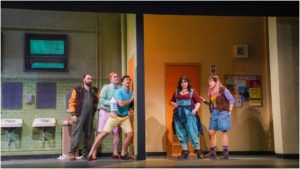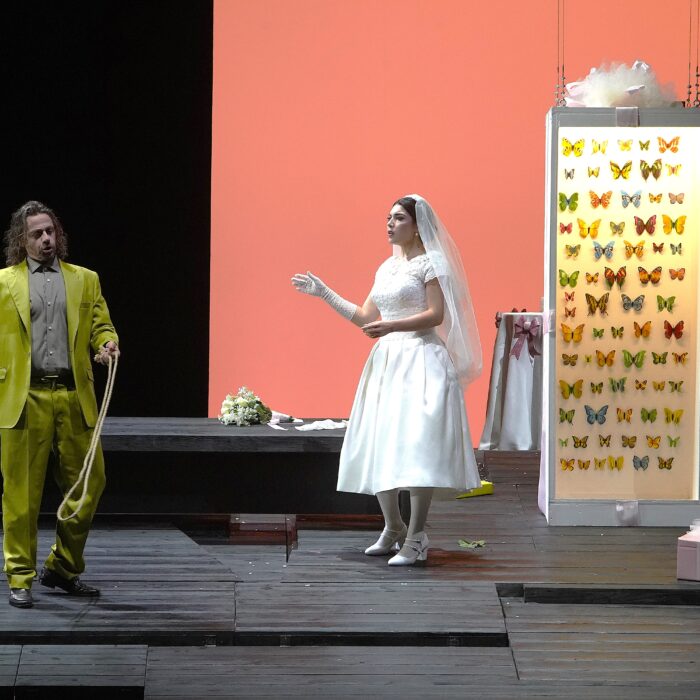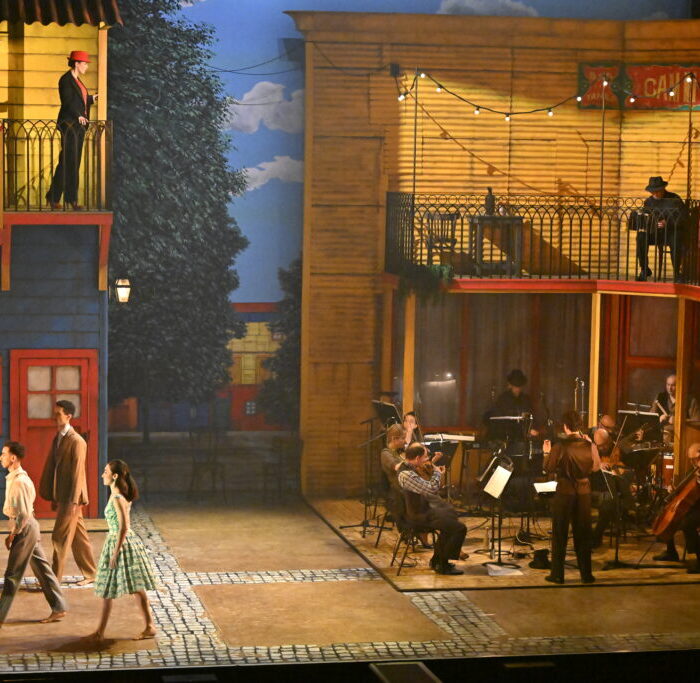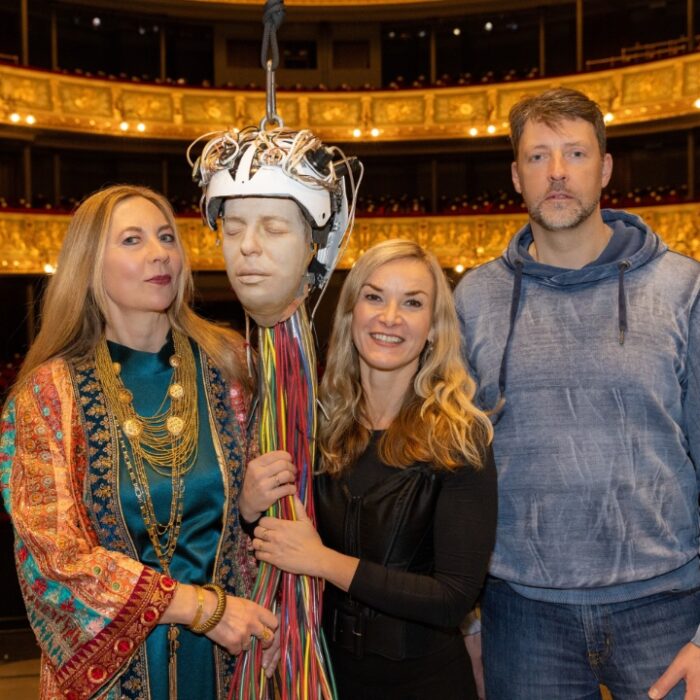
The Juilliard School 2019-20 Review: Così fan tutte
Mozart & Da Ponte’s Controversial Work Goes To The 21st Century
By Jennifer Pyron(photo credit: Richard Termine)
The Juilliard School opened the 2019-20 opera season with a refreshing and intimate interpretation of Mozart’s “Così fan tutte.”
The overall production under the direction of David Paul evoked an immediate realization of why Mozart may have chosen Lorenzo Da Ponte’s libretto based on the effective means of humor to challenge any serious contemplation of the characters’ dizzying ambiguity and radical biases. Paul set the production in America in 2019 and thus proved a vital realization with a glance into the sometimes controversial lives of our modern youth, whether one agrees with their thoughts and decisions or not.
Also effectively, Conductor Nimrod David Pfeffer focused more on the role of Mozart’s timeless music and invited the audience to easily recognize what is beautiful and hopeful despite circumstances that are created by destructive choices and the damaging ideals.
West Naples High School
In this production, characters Ferrando, Dorabella, Fiordiligi and Guglielmo are students at “West Naples High School” casually dressed in a 1990’s Kurt Cobain meets Courtney Love style. Costumer Designer Sara Jean Tosetti was brilliant with her choice of this attire because it depicted a time when teenagers experimented more with role reversal in fashion. The sloppy mess of flannel shirts tied around waists, baggy denim overalls, and chunky Doc Martin boots translated another way to view Da Ponte’s overall controversial libretto and the correlation that it has with emotions of angst, betrayal, confusion and ambiguity. Tosetti evoked nostalgia with her design creations and this helped set the tone for the entire production’s message.
Don Alfonso was dressed as a janitor equipped with a vape pen that he addictively inhaled while informing Guglielmo and Ferrando that their lovers are not what they may seem. While challenging the young men to bet against their lovers, Fiordiligi and Dorabella, he claimed that women are innately unable to be faithful in a relationship. William Socolof as Don Alfonso was hilarious as he frenetically paced the high school bathroom describing the plan to disguise Guglielmo and Ferrando. Socolof’s demeanor was reminiscent of John Bender in the 1985 movie drama “The Breakfast Club” and cleverly depicted his cynical character’s boisterousness.
Socolof’s enjoyment within this role was palpable and he effectively managed to both develop and lead cast members with skill throughout the entire production. Most notably, his voice was consistent and well connected to the music as he sang arias “Vorrei dir, e cor non ho” and “Tutti accusan le donne.” Socolof made it easy for listener’s to follow the story, laugh at the humor and stomach the soap opera drama.
Soprano Mer Wohlgemuth as Despina also made a strong initial impression based on her quick wit and pace. Wohlgemuth’s tempo might have felt slightly ahead throughout, but this proved beneficial because she came across as being in control of her character’s persuasiveness and manipulative influence. “In uomini, in soldati” sounded smart and effortless as Wohlgemuth sang with clarity and originality.
She moved with poise on stage and set the bar of professionalism in every way which shed light on the characters of Dorabella and Fiordiligi. “Una donna a quindici anni” was also an excellent example of how Wohlgemuth could persuade the young women and listeners alike.
Confused Lovers
As the drama developed, soprano Kathleen O’Mara was brilliant as Fiordiligi and blossomed into her role. O’Mara’s voice transformed both arias “Come scoglio” and “Per pietà, ” while the audience’s applause could not have been more supportive. Everyone appreciated how O’Mara created greater beauty with every note and her voice had a visceral effect that transported listeners outside of the drama, away from the injustice of how women are portrayed by Da Ponte, and into an otherworldly realm of sincere hope. One might have felt the need to hold their own breath just to hear more of her voice and to feel the naturally intoxicating effect she realized through Mozart’s music.
O’Mara was also supported by mezzo-soprano Megan Moore as Dorabella. Moore portrayed Dorabella with an edge based on undeniable sex appeal; one might have felt her voice the perfect mix for the part. Moore’s “Smanie implacabili” and “É amore un ladroncello” were grounded in her voice’s richness and color. She leaned into her natural ability to sound vocally developed by applying this same energy to her character’s physically passionate moments with Guglielmo.
During one moment when Moore and Erik van Heyningen were exploring their mutual attraction, Moore portrayed a woman in control of her outcome and unashamed to express herself in the moment. She showed her strength as an actress throughout, adding another dimension to her talent as a singer.
Baritone Erik van Heyningen and tenor James Ley also gave the audience insight into the minds of two easily persuaded and anxiety-ridden young men.
Van Heyningen classified Guglielmo as the most sexually explorative among the two and translated this freedom as he sang. His arias “Non siate ritrosi” and “Rivolgete a lui lo sguardo” felt enlivened with this energy and his naturally handsome demeanor was both honest and appreciated. Van Heyningen might have been the most convincing male character in this production when it came to seduction and heartbreak.
Another example of how this production focused on Mozart’s music was during “Donne mie, le fate a tanti” when van Heyningen delivered the libretto’s distasteful message about male dominance by provocatively delivering it as tragically beautiful. One might not have agreed with his character’s deceptiveness or damaging bias, but it was impossible for one not to feel the underlying enchantment of Mozart’s music, especially through van Heyningen’s voice.
It might be difficult to empathize with any of the men in this opera, but if it were possible to feel sad about how the young men destroyed so much along the way, both for the women and for themselves, this single message alone could be heard most clearly when tenor James Ley sang “Tradito, schernito.” Ley was the perfect match for this role as he sang Ferrando with playfulness and a young heart. His voice drew in listeners based on its pure tone and innocent expressiveness. He was like a lamb is to a heartless wolf that is reminiscent of Mozart’s music when paired with Da Ponte’s libretto.
In all, this was a sobering take on one of the more controversial operas ever written. The contextual shift undeniably made it far easier to dialogue with its problematic themes and ideas.



